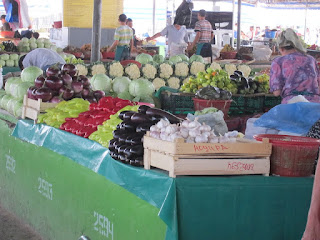Mudbrick minaret
Madrasa? Mosque?
Carved timber posts inside mosque
"Djuma Mosque ... was established in the 10th century and rebuilt in 1788-89, although its celebrated hypostyle hall still retains 112 columns taken from ancient structures." (Wikipedia)
Carved timber doors
Incomplete minaret
"The large blue tower in the central city square was supposed to be a minaret, but the Khan died and the succeeding Khan did not complete it, perhaps because he realized that if completed, the minaret would overlook his harem and the muezzin would be able to see the Khan's wives. Construction was halted and the minaret remains unfinished to this day." (Wikipedia)
Mudbrick fortress walls
Wikipedia advises the city has two parts, an inner, old town (Itchan Kala), encircled by brick walls and possibly dating back to the tenth century (fifth and sixth centuries, per Wikitravel), and an outer, modern town (Dichan Kala), formerly protected by a wall with eleven gates.





















